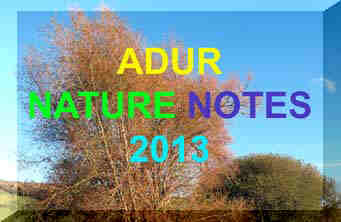

Adur
Levels
&
Estuary
2013
11
December 2013
A
Kingfisher
arrowed its way over the River
Adur by Coronation
Green at dusk. It was recognised by its
flight, as it flew like an arrow in the fading light over the large expanse
of water towards the new Adur Ferry Bridge
on the high flood tide. It
was the first Kingfisher
I have spotted this year.
8 December
2013
At
high tide in the afternoon I was surprised my the
numbers of gulls over Adur Recreation Ground
numbering at least a thousand at a rough estimate. Several hundred Black-headed
Gulls formed a flotilla on the tidal inlet
known as the Flood Arches with hundreds of mixed gulls swirling in the
air under a patchy cloudy sky. Most of the other gulls were thought to
be Common Gulls
but it was difficult to be sure at a distance.
2 December
2013
A
Little
Grebe was seen twice on the surface of
the River Adur
very close the Toll
Bridge at Old Shoreham, and then it dived
under again and it disappeared from view as soon as I got my camera out.
1 December
2013
A
brief cycle ride to Old Shoreham was predictably dull. As it was December
I noted Common Toadflax, Sow Thistle,
Yarrow
and a Common Hogweed
still in flower.
 12
November 2013
12
November 2013
One
sunny still day with hardly a breeze, A Red
Admiral Butterfly flew across a very crowded
Adur
Ferry Bridge and a short time after one flew across the River
Adur adjacent to the very new bridge.
A
Little
Egret fished in the shallows at low neap
tide
by Coronation Green.
Later, by the slipway at Emerald Quay an immature Herring
Gull had caught or found a Shore
Crab which it was repeatedly pecking at.
7 November
2013
My
view from the Norfolk Bridge over the
estuary towards the new Adur Ferry Bridge
was over the River Adur
that was a still as a mill pond on the high tide
in the middle of the day. This was in contrast to the preceding days when
the water had been choppy with white capped waves. As my eyes adjusted
for the reflections of the houseboats and buildings in grey murky water,
I noted a hundred plus birds were present in at least three flocks. Even
through my binoculars the first flock of dark medium-sized Cakile birds
resting on the still river were too far away for a positive identification.
I think they were probably Pochards.
As I was counting them, all twenty took flight in unison and flew west in a loose flock. The other two flocks were mixed waders congregated very close together on this strips of vegetated mud above the still water. They were closer but because of their hulking positions it was still hard to discern what the majority of them were. Intermittently birds took flight but the visibility was far from ideal. I thought I identified the usual flock of Turnstones, a few of the familiar Grey Plovers, and I think some of the others were Godwits from the shape of their beak. I returned over an hour later when the swing bridge was open for boat traffic. The large flocks had already disappeared and many of the waders that remained were frightened off when a Grey Heron landed.
 15
October 2013
15
October 2013
It
was muddy underfoot but the sun shone intermittently through gaps in the
clouds. This produced a very mixed and varied day. Turnstones
foraging
under the Railway Viaduct and Lapwings
on the mud at low tide were regular occurrences
and expected. But more surprising on a cloudy day were two active flying
butterflies,
a Red Admiral
and immigrant Clouded Yellow
over the River Adur.
A
Dark
Bush Cricket, Pholidoptera griseoaptera,
was
spotted on the verges of the Waterworks Road,
Old Shoreham. These crickets are occasionally
seen late in the year. It was not warm enough
to expect to see many butterflies
but 21 were seen of six species, with a third
of them Meadow
Browns on Mill
Hill. Notably there was a cleistogamic flowering
Dog Violet on the lower slopes of Mill
Hill.
Full
Butterfly Report
Adur
Grasshoppers & Crickets
Adur
Violets
12
October 2013
 |
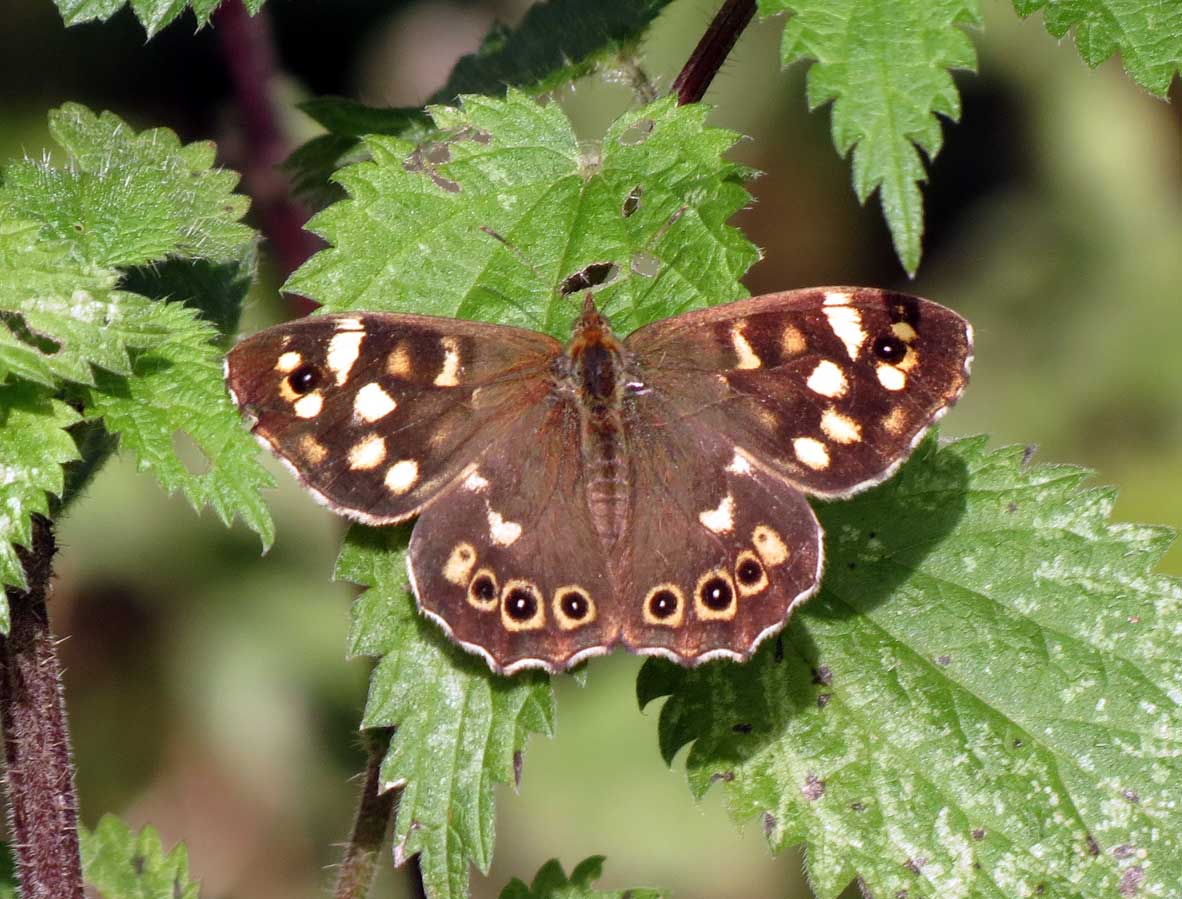 |
 |
|
|
|
|
A Bank Vole, Myodes glareolus, was seen on the road verge by the Cement Works south of Dacre Gardens, Upper Beeding. The vole was more intent on feeding that running away but it never kept still.
10
October 2013
A
Sparrowhawk
was seen flying near the Sussex Pad mobbed by a Crow.
| 7
October 2013
Alarm and escape confusion attracted my attention as about twenty Starlings suddenly took flight from the highest ledges of the Shoreham Cement Works building on the east side of the road. A moment later a Peregrine Falcon glided just over the concrete ruins. The falcon was identified by its narrower more streamlined wings contrasted with the broader Sparrowhawk. 6
October 2013
Report
by Vince Massimo on Sussex
Butterflies
|
 |
29
September 2013
 |
 |
 |
 |
|
|
|
Ash
branches hanging
|
heavy with keys |
I cycled
under the Ash
branches were hanging heavy with keys
almost forming a complete canopy over parts of the Downs
Link Cyclepath from Old Shoreham to Upper
Beeding. Colour was in the hedge border, full of wild fruits and berries,
the red of Hawthorn,
Dog
Rose (Rose
Hips) and
Guelder
Rose (a honeysuckle) were most noticeable.
The birds seen were mostly insect eating ones, notably the Chiff-chaff;
or were they Willow Warblers?
When the sun came out so did a few of the more notable flying
insects including at least seven Comma
Butterflies and a few Speckled
Woods in the shade, as well as a few Small
White Butterflies and at least one Large
White Butterfly. A Common
Darter (dragonfly)
was seen at Upper Beeding and a Southern
Hawker at the southern edge of the Saltings
Field at Bramber by the River
Adur. The splendid large hoverfly
Volucella zonaria, settled on a flowering
Buddleia on the cyclepath by the Cement
Works.
Meadow
Muses (Berries)
Chiff-chaff
& Willow Warblers (BTO)
27
September 2013
A
Grey
Heron stood like a statue on the muddy
margins of the River Adur
between Old Shoreham and Cuckoo's Corner. Ash
trees drooped wit the weight of their keys
along the Coombes Road.
| 22
September 2013
The River Adur was was in flood from the from the incoming equinoctial spring tide. There was little of no breeze so the incessant water movement was only when it was pushed up the banks and upriver. Over a hundred Swallows in low density flights made an impressive sight as they swooped low over the flat surface of the river. One of these hirundine birds twice dipped into the salt water with a distinctive splash. After the recent rain, hundreds of mushrooms appeared on Anchor Bottom and one clump on the edge of the river towpath. |
 |
 |
19
September 2013
A handful of House Martins and at least one Swallow were flying around the Riverbank Business Centre (north of Ropetackle) and many of the birds were flying in a large open window of an unoccupied prefabricated building on the site. The building had a large hole in the roof and they did not appear to be flying out of this immediately. Over the River Adur a Near Gale was blowing and capping the small waves with white. The wind blew from the south-west on the high tide. |
11
September 2013
There
were so many Sparrows
and Starlings
in the Buddleia
bushes between Ropetackle and Old Shoreham, that I am surprised there were
occasional Large White Butterflies
and a few Small Whites
that escaped their feeding attentions. I spotted a Red
Admiral on the Buddleia
by
the Buffer Stop and a Holly Blue
visiting Bramble flowers. The same pattern
of the absence of butterflies
was repeated between Old Shoreham and the Cement Works, although the birds
were not omnipresent. More Large Whites
on Buddleia and
a few Speckled Woods
on the leaves only were noted on the outgoing cycle journey. A small chirm
of perhaps only five Goldfinches
were seen leaving the hedge near the Teasel
heads which were widespread and common on the verges of the cyclepath.
Full
Butterfly Report
5 September
2013
A
small family of Moorhens
resided on the duckweed
covered Annington Sewer
north of Botolphs.
Mallards on the River Adur at Bramber
Shortly afterwards, I spotted a hen Mallard and seven chicks on the River Adur swimming against the incoming tide under Bramber Bridge. Apparently, eight chicks hatched out from a nest in a tree near St. Mary's House where a small stream feeds into the river. A solitary Mallard was also seen near the small footbridge over the river near (east of) Steyning.
As I walked my bike on the footpath on the Bramber side upriver from Bramber Bridge, a sudden splash turned by head in time to see a 20 cm fish jump completely out of the water, twisted in mid-air to show its flanks with a tinge of gold before disappearing under water not be seen again. I could see that it was elongate and trout shaped and it wasn't a Grey Mullet or Bass or Sand Smelt the fish usually seen in the brackish part of the river further south. (The nearest freshwater is over three miles to the north. It was mid-tide. Freshwater fish have been reported in the brackish part of the river in the past.)
At
least two Southern Hawkers, (dragonfly)
were seen over the Downs Link Cyclepath and
another looked much larger over a drainage stream near the river near Botolphs.
Butterfly
Report
25
August 2013
After
the rain, there were only small muddy puddles on
the Downs Link Cyclepath north of Old
Shoreham, where my first Southern Hawker,
(dragonfly)
of the year landed immediately in front of me on the clay path. Thirteen
butterfly species were seen on an overcast day,
all bar one of the Downs Link Cyclepath
from Old Shoreham to the Cement Works.
Full
Butterfly Report
 |
 |
 |
 |
|
|
|
|
|
A few
Holly
Blues fluttered around the bushes and
a half a dozen Speckled Woods congregated
in the shade. Buddleia
proved the most attractive for butterflies and the abundant Fleabane
their second favourite. The total count of white
butterflies was over a hundred in an hour
and the cumulative count of the other butterflies seen was about sixty.
Buddleia
bordering the Downs Links Cyclepath from
Old Shoreham to the Cement Works was still in flower
and attractive to the five usual vanessid
large
butterflies
and the Brimstones
and eight other butterfly species making fourteen
species in an hour. Buddleia
proved the most attractive for butterflies and the abundant Fleabane
their second favourite. The total count of three species of white
butterflies was over a hundred in an hour
and the cumulative count of the other butterflies seen was about sixty.
Full
Butterfly Report
4
August 2013
In
the morning a Speckled Wood Butterfly
visited by semi-wild garden in Corbyn Crescent, Shoreham. It stayed for
a few minutes settling on a Garden Privet leaf. Down by the estuary
the cyclepath in Old Shoreham were lined with purple Buddleia.
It is aptly named the Butterfly
Bush as it proved an attractive
nectar source for a dozen or more vanessid
butterflies seen on a couple of bushes next to the River
Adur on a high neap tide.
 |
 |
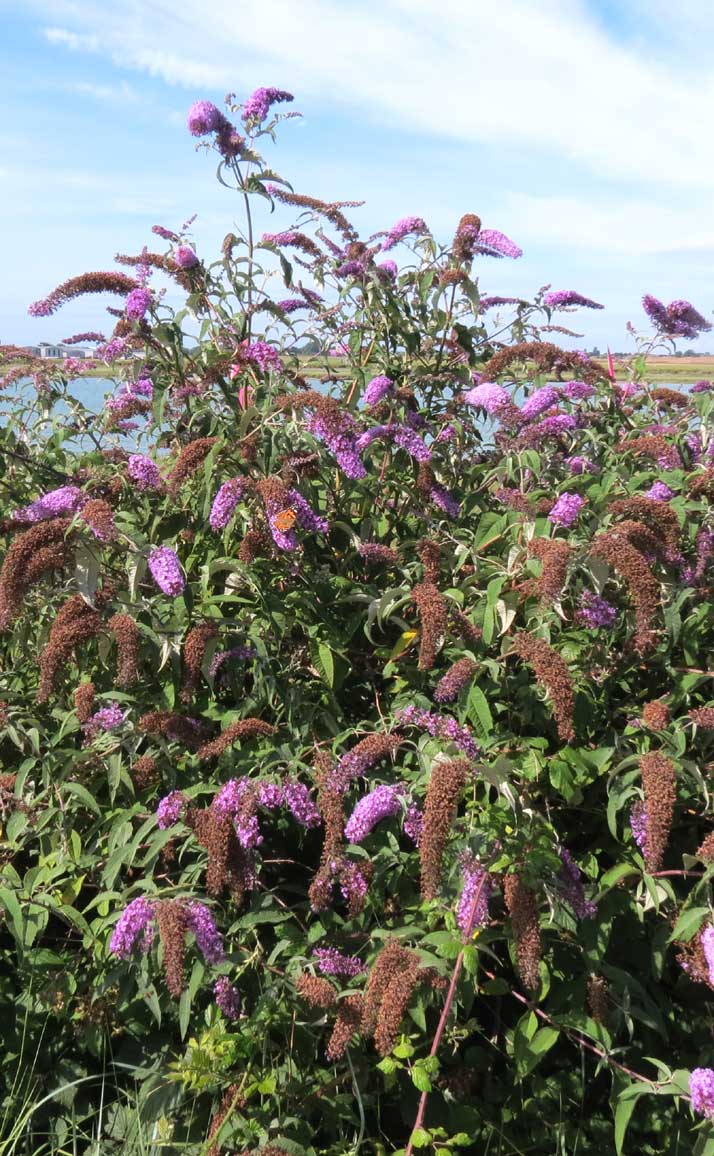 |
 |
Painted Lady
It
seems there has been recent influx of the immigrant Painted
Lady as the first seen and the most prevalent
butterfly
and found exclusively feeding on the Buddleia.
It was accompanied by a few Red Admirals
and at least one Peacock Butterfly.
Nearby there were Green-veined Whites,
Large Whites, Meadow
Browns
and
Gatekeepers
in
order of frequency.
 |
2
August 2013
Flowering Buddleia adorned the hedgerows bordering both side of the cyclepath from Ropetackle to Upper Beeding (Dacre Gardens) and this proved to be an attraction to scores of Red Admirals (25+ actually seen). Most of the usual butterflies were fluttering around the flower rich* meadow-like verges. The most numerous were the Green-veined Whites (25+) but there were frequent Meadow Browns, Gatekeepers, Common Blues, and Large Whites, with occasional Peacocks and Comma, and a few Speckled Woods and at least one Small Skipper. A Silver Y Moth was disturbed on the cyclepath verges. (* The Cyclepath verges hosted many prominent flowers attractive to butterflies including Hemp Agrimony, Fleabane, Ragwort and Marjoram as will as less favoured Rosebay Willowherb, Greater Willowherb, Melilot, etc.) |
26
July 2013
No
new butterfly
species could be added to list of the previous
two days, although the usual ones were present of a cycle trip
to Cuckoo's Corner along the towpath and back along the Coombes Road: frequent
Gatekeepers,
Large
Whites, Small Whites, occasional Meadow
Browns,
Small (or Essex) Skippers, a few each
of Comma Butterflies, Speckled
Woods, Red Admiral,
and one Peacock
Butterfly and one Marbled
White.
As
I was about to dismiss it as just a boring jaunt in the weak sunshine when
I spotted a Grey Heron,
poised like a stature on the stream bridge on private land at Farrows
Barn, Ladywells. The large bird flew off gracefully
as I retrieved my camera from its small bag. A few minutes later, I saw
a large white presence high in the trees along the Coombes Road (north
of Cuckoo's Corner). It turned out to be a Little
Egret.
 |
On
a high spring tide at the Cuckoo's Corner inlet,
shoals of thousands of Sand Smelt,
Atherina
presbyter,
rippled
the surface of the murky water. There were many of them in over a hundred
separate shoals just under the surface. The small shoals followed a leader
in an arrow formation and the much larger shoals formed dark rugby ball-sized
schools numbering over a hundred in each. And the even larger balls of
this small elongate fish numbered several hundred in each. Every half minute
the relatively still unruffled river was interrupted by a commotion followed
by a much larger splash, assumed to be larger predatory fish attempting
to feed. The most likely candidate was the Bass,
Dicentrarchus
labrax,
and one small first year Bass fry
was seen.
Adur
Levels 2013
 |
 |
 |
 |
|
|
|
|
|
On
a warm sunny day, a short ride in the middle
of the day along the busy Downs Link Cyclepath to Upper Beeding produced
moderate butterfly
activity. The first appearance was a Small
Skipper on the verges of the Steyning
Road south of the Cement Works. Simultaneously, a restless Marbled
White settled for a second on a Chicory
flower
amongst the long grasses. A few
Meadow
Browns
were
also seen on the verge on the same latitude as Old Erringham.
There
were occasional flashes of orange on the Downs Link. These were a few pristine
Comma
Butterflies and later half a dozen bright
Small
Tortoiseshells. There was also a probable
Ringlet
amongst the Meadow
Browns
and
another Marbled
White. Large
Whites were conspicuous everywhere but
only about ten of them were seen. On my return along the Downs Link there
were more Small Tortoiseshells
and a pair of Speckled Woods.
The Burnet
Companion Moth (badly faded) was attracted
to Marjoram on
the Downs Link Cyclepath south of the Cement Works.
I
counted 26 Mute Swans
on the River Adur
at low tide by the Railway
Viaduct.
Full
Butterfly Report
12
July 2013
A
handful of Swallows swooping to and fro over the derelict Riverside
Industrial Estate (north of Ropetackle) by the River
Adur was a site to behold on a cool start
to a warm afternoon.
10
July 2013
From
Steyning High Street, I followed the attractive Church Street in a south-westerly
direction, past St. Andrews Church until the road terminated at the junction
with Jarvis Lane. I followed this road east over the bridge over the old
railway until the houses stopped and a stile and footpath took me over
low lying cattle pasture to the banks of the River
Adur. I crossed by a small metal bridge
and followed the towpath past Salting's Field
to Upper Beeding.
Meadow
Browns
(35+)
and equally numerous Small Tortoiseshells
(35+)
fluttered around. A stream runs through Saltings
Field and this proved of interest with small unidentified blue
damselflies (either
Azure or Common Blue). A female Mallard
came into view and a Moorhen
scuttled into shelter over the water surface. The bright orange of a Comma
Butterfly was definitely identified as
it settled on a Bramble
next to the stream. In an area of shade in
Steyning, two Speckled Woods
fluttered around. There was also a Large
White seen by the river.
 |
 |
 |
|
|
|
|
The
River
Adur running east of Steyning was in flood
with the high tide. I counted 22 Mute
Swans in this narrow stretch of the river.
An hour later I counted a further 25 Mute
Swans in a group south of the Toll
Bridge (Old Shoreham) and as this was from a passing bus, there may
have been more.
Adur
Butterfly List 2013
9
July 2013
The
Adur
estuary was clear enough to see through, but I only saw a solitary Grey
Mullet in the shallows by Ropetackle.
Another warm day (24.9 °C)
and
the butterflies were both frequent and restless
in the sunshine. My first Small Skipper
(12+) of the year was seen on the Downs Link Cyclepath but like the frequent
Meadow
Browns
(50+)
and equally numerous Small Tortoiseshells
(50+)
they were not inclined to settle. A Green-veined
White Butterfly was positively identified
on the verges of the Downs Link Cyclepath (north of Old Shoreham) and there
were a handful along the route to Annington
Sewer (north of Botolphs) and back. Almost
all the possible Ringlets
turned out to be Meadow Browns,
but two Ringlets
were almost certainly seen near the stream adjacent to the cyclepath.
 |
 |
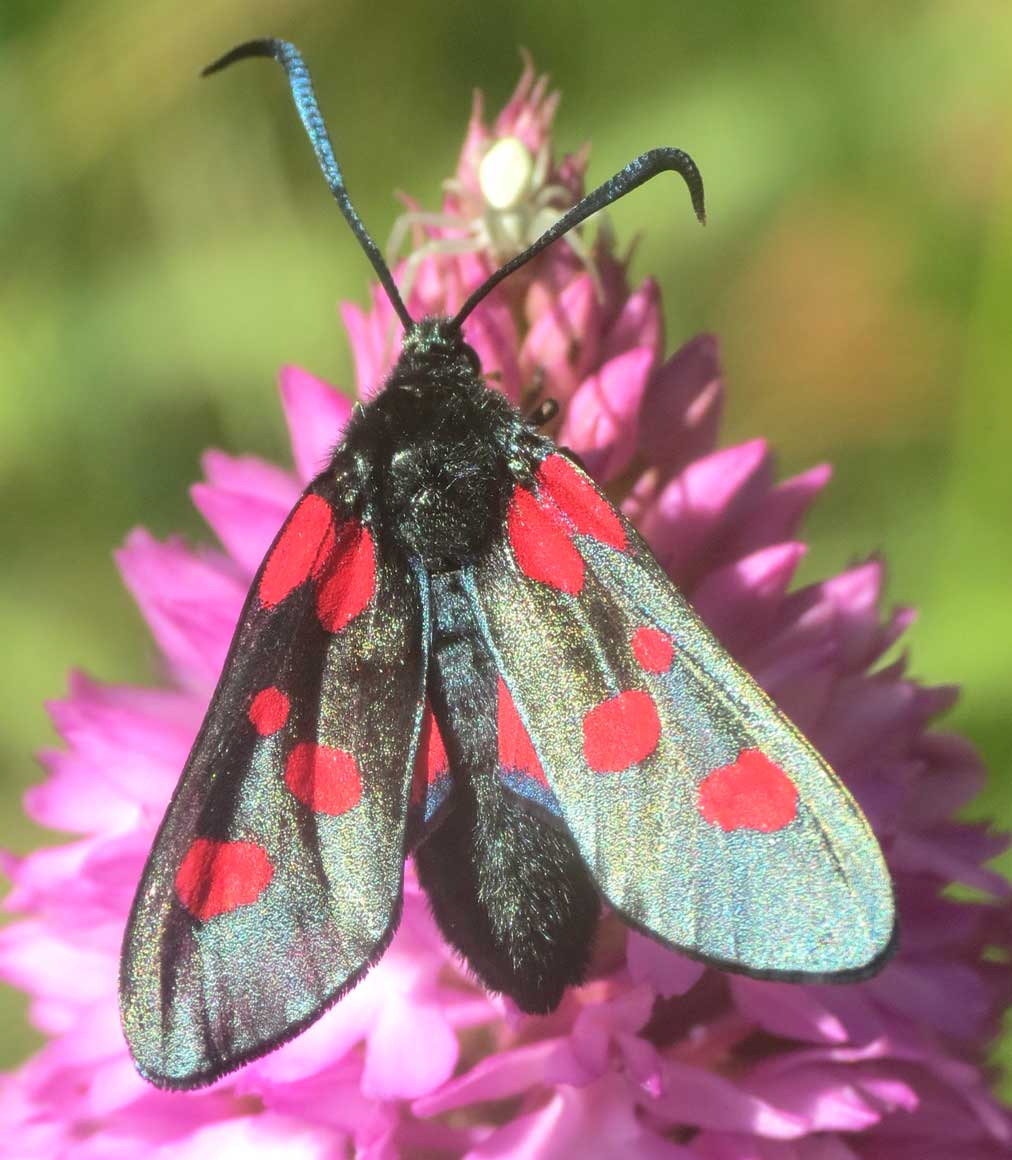 |
|
|
|
|
The
bright orange butterfly on the Downs Link Cyclepath was almost certainly
a Comma.
On the verges next to
Annington Sewer,
a Narrow-bordered Five-spot Burnet Moth
visited
a Pyramidal Orchid.
Pyramidal
Orchids were frequently seen amongst the grasses
and other vegetation which were more luxuriant and dense and tended to
make the orchids
much more difficult to see than in normal years.
Full
Butterfly Report
Adur
Butterflies: First Dates
8 July
2013
A
single Swallow
flew to and fro at low level over the mostly derelict Riverside Industrial
Units and towpath (north of Ropetackle).
7
July 2013
In
the warmth (25.9 °C)
of the midday
sun, my first Meadow
Brown
Butterflies of the year, with the first
day-flying Narrow-bordered Five-spot
Burnet Moth and probably the first Ringlet
Butterfly were seen over the verges of
the Downs Link Cyclepath
100 metres south of the Cement Works. There was also a bright orange butterfly
that was not recognised to species.
Full
Butterfly Report
Adur
Butterflies: First Dates
Adur
Burnet Moths
| 30
June 2013
Two Small Tortoiseshell Butterflies were seen over the verges of the cyclepath north of Old Shoreham (in the area where I thought I saw a Painted Lady a week earlier). A Small White Butterfly fluttered in the humid sunshine. A few Pyramidal Orchids were seen amongst the long grasses (taller than usual this year). |
| 24
June 2013
The
River
Adur Project: documentary for schools
was published.
|
Education Resource Package for Schools Click on the button above to go to the web page to download the Powerpoint presentation. |
23
June 2013
With
the white crested waves blown against the Purslane-lined
banks of the Adur estuary on a high spring tide,
and a Grey Heron
soaring under a cloudy sky, it appeared more like a day near the autumnal
equinox
than the middle of the summer. An orange butterfly
was buffeted by the breeze, blown 20 metres one way and then the other
so much I just got a single close enough glimpse and it looked as though
the only species it could be was an immigrant Painted
Lady. This butterfly, seen over the Downs-Coastal
Link Cyclepath (just north north of the A27
Flyover) was the first one I have seen
for several years. The poisonous Hemlock
Water Dropwort was flowering
on the verges of the cyclepath near Old Shoreham.
Adur
Butterflies: First Dates
Adur
Butterfly List 2013
8 June
2013
Two
Grey
Mullet were seen swimming in the shallows
by Coronation Green,
Shoreham.
Adur
World Oceans Day 2013
5 June
2013
A
Swallow
flew at head height ride in front of my eyes as I cycled on the towpath
just north of Ropetackle. As I was cycling along the Downs-Coastal Cyclepath
north of Old Shoreham I heard some alarming squeaking sound. I half thought
it was my bicycle but it was young birds in the hedge that borders both
sides of the old railway track. They made such a loud racket, I thought
they were Magpies.
Suddenly a male
Beautiful
Demoiselle, Calopteryx virgo, also
flew at head height in front of me, but I could not get my camera out quick
enough. Speckled Wood Butterflies
were occasionally spotted on my brief journey.
Adur
Damselflies
There has been reports of a smelly plankton bloom in the sea and River Adur. The offending organism was Phaeocystis. The live and dead plankton could be seen in the estuary water and the visibility was severely impaired. As the salt water lapped against the muddy shore, it looked the colour of orange juice in patches and overall it was murky.
17
May 2013
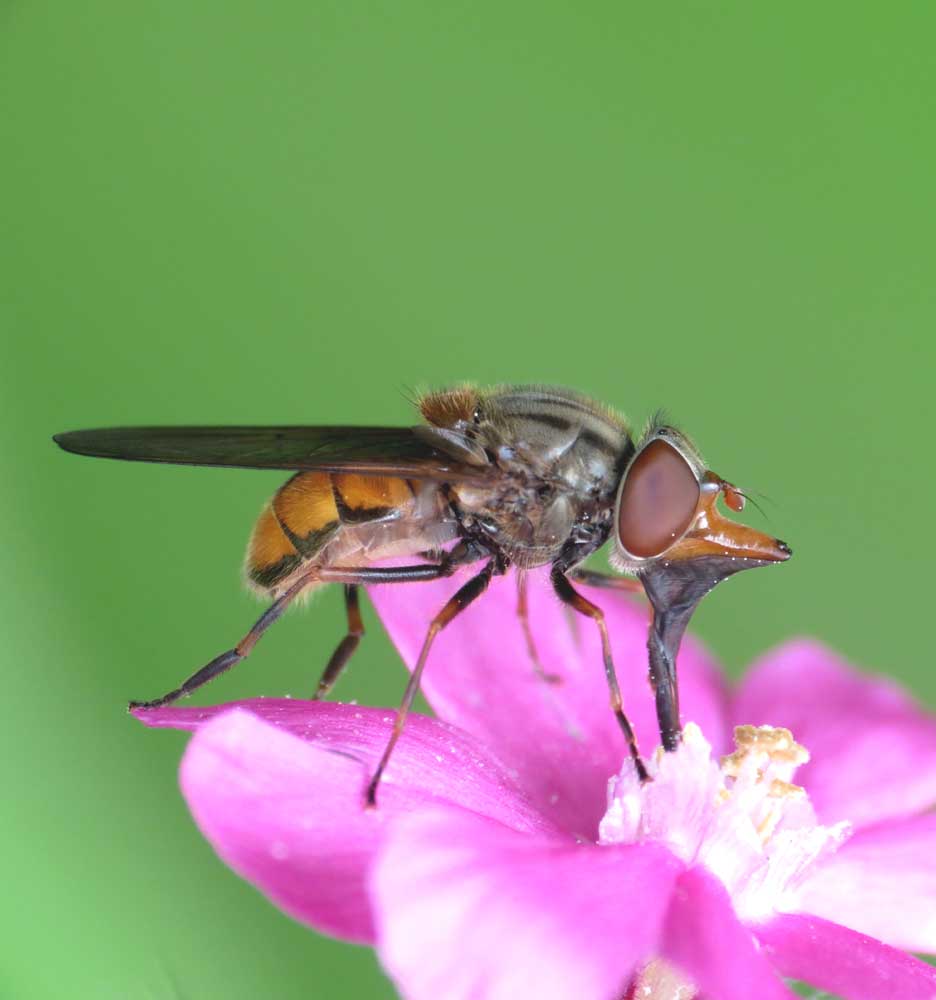 |
 |
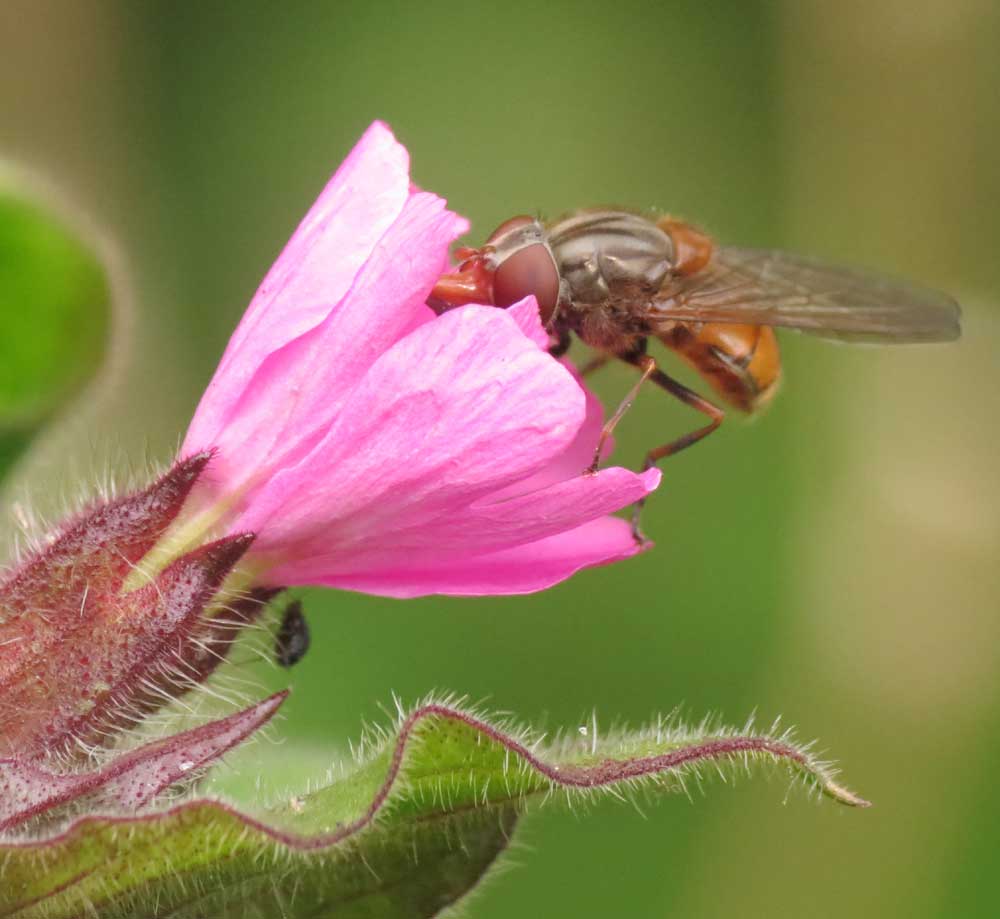 |
Rhingia campestris hoverflies visited Red Campion on the wild meadow managed verges of the Coombes Road by Ladywell's Stream.
7 May
2013
Green-veined
White Butterflies were confirmed for the
first time this year sparring with male Orange-tips
on the footpath section of the Waterworks
Road, Old Shoreham.
5 May
2013
The
first Rhingia campestris
hoverfly
of the year was seen over the verges of the Waterworks
Road.
3 May
2013
Hardly
a cloud in blue sky, and the bees
and butterflies were
out in the weak sunshine. A flutter of a restless
Holly
Blue was the first butterfly to be seen
over the Waterworks Road,
Old Shoreham. This was quickly followed by my first definite of the year
Large
Whites followed by a male Orange-tip.
A Peacock Butterfly
flew over the cyclepath north of Old Shoreham.
Adur
Butterfly List 2013
Adur
Butterflies: First Dates
 |
 |
 |
 |
|
|
|
|
|
On the verges of the cyclepath I saw my first ever local Snake's Head Fritillaries, Fritillaria meleagris, in flower in the wild. In a running stream by the cyclepath a shoal of Sticklebacks looking very healthy darting about. One small male fish sported a bright red flank.
1 May
2013
A
few firsts of the year were recorded as the
sun came out
and with it the bumblebees
and a few hoverflies.
The first of a few Holly Blue Butterflies
were seen over the Waterworks
Road, Old Shoreham
22
- 23 April 2013
 |
 |
|
|
|
I spotted by first fish of the year, Sticklebacks swimming in the shallow drainage stream that separates the fields north of Cuckoo's Corner on the Coombes Road. At least two Comma Butterflies and my first bug of the year were seen over the Waterworks Road. A Common Green Shield Bug, Palomena prasina, rested on an Alexander leaf.
17
April 2013
 |
 |
|
|
|
Two Little Egrets were seen feeding in a flooded horse field. I have no idea what they were lunging forward to catch.
28
March 2013
In
the afternoon just the usual gulls
were present on mid-tide from the Norfolk
Bridge up to the Toll Bridge,
although three pairs of Teal cruised
along the tideline, dipping their heads under regularly.
20
March 2013
Do
Pheasants
know its is close season? One male bird trotted down the Waterworks
Road, Old Shoreham, but quickly disappeared
entirely in to the Maple
scrub. Several clumps of Jew's Ear Fungus,
Hirneola
auricola-judae, were on discarded branches
that were blocking the route of footpath 3140
next to Steyning Road.
Adur
Fungi Reports
 |
 |
|
Cyclepath north of Old Shoreham |
Miller's Stream in flood near the Waterworks' House north of Old Shoreham, view from Mill Hill |
12
March 2013
In
the afternoon one Snipe
flew over the road by the Norfolk
Bridge and another was feeding on a verge
beside Shoreham Airport.
An
Avocet
was seen roosting with the more usual waders on Adur Saltings but flew
off before high tide in the morning.
5
March 2013
A
juvenile Common Seal, Phoca
vitulina,
hauled up on a River Adur
mud bank two miles inland from Shoreham-by-Sea.
13
February 2013
In
the evening I disturbed a Rabbit
in the headlight of my lights under the moon less sky on the cyclepath
south of Old Shoreham. Rabbits
are mainly crepuscular animals and are only
seen in the day in this area if they are ill.
7,
14-15 February 2013
A
juvenile Common Seal,
Phoca
vitulina,
has been spending time in the River
Adur. The seal was first seen on 7th
February in the morning, It appeared that
the seal had swum back out to sea. However, on the 14th
February the seal was hauled out on the estuary
mud on the south side of the river opposite Surry Public Hard, and reported
again in a different location on 15th February
by the Shoreham Port Authority.
12
February 2013
There
was a considerable amount of standing water
on the fields on the way to Upper Beeding (seen from the bus) where I also
saw my first Rabbit
of the year.
8 February
2013
On
an overcast day, there was almost nothing of interest and less than the
normal number of gulls
on the river with no Lapwings
despite the low tide. North of the Toll
Bridge, two adult Little Grebes
dived under the shallow stream of water.
30
January 2013
There
were large flocks of fifty plus Wood Pigeons
over the Coombes Road and the fields between the road and the river.
I had planned to cycle along the western towpath but I turned back because
it was too muddy and because there was very little of interest to see.
The
Lapwings
were back on the mud flats north of the Toll
Bridge.
22
January 2013
Two
Oystercatchers
roosted (on one leg it appeared) on the mudlfats by Ropetackle as a Lapwing
and a Dunlin
fed around them. The Oystercatchers
appeared to be asleep until one was inclined to preen itself and the distinctive
red beak could than be seen clearly at just
before nine in the morning.
 |
 |
 |
I had a look around the snow and ice covered Adur flood plain north of Upper Beeding. There were hardly any birds to be seen, just an occasional Crow and no wandering flocks. Saltings Field next to the river was ice bound as shown in the photographs above.
21
January 2013
On
the tidal pool to the west of Adur Recreation Ground, a small flock of
Teals
swam in the stream of water and ventured out to feed on the mud flats in
the company of a few Dunlins,
a few Mallards,
two squabbling Redshanks and
just the one Lapwing.
 |
 |
Teals on the Adur Tidal Pool (next to Adur Recreation Ground)
18
January 2013
Snow
blew vertically in from the east (Force
4) during daylight. Around midday
the snow was an inch (25 mm)
deep on the cold ground in Shoreham with the air temperature only just
below freezing. On the cyclepath north of Old Shoreham the depth of snow
was measured at 60 mm.
By late afternoon
the snow eased off, turned to sleet and in town the snow turned to slush,
but in the residential streets there was still snow on the pavements at
dusk.
Shoreham
Weather 2013
Adur
Trees 2013
 |
 |
|
|
|
At low tide on the River Adur the Dunlins were feeding much closer to the shore than usual.
January
2013
 |
 |
 |
|
|
|
|
10
January 2013
The
Traveller's
Joy, Clematis, in
the hedgerows north of Old Shoreham had long since (Winter
2012)
turned to Old Man's Beard.
There was still standing water in the saturated
low level meadows.
 |
 |
Altogether the trip up the cyclepath looked so unpromising that I turned back before the Flyover. Very tiny midges (or midge-like insects) were in my face as I stopped to take a photograph. A Cormorant stood high on a pole. The House Sparrows were making a lot of noise in the hedgerows adjacent to the cyclepath south of Old Shoreham.
9 January
2013
Redshanks
still
congregated three together on the edges of mud flats
as the tide came in. A hundred strong flock of
Lapwings
roosted
south of the Toll Bridge instead of
their more usual position on the mud flats to the north of the Toll Bridge.
7 January 2013
Redshank
It was too muddy for the downs, but at least it was not raining after 2012 was the second wettest on record. At low tide on the River Adur estuary at Old Shoreham, there were just the usual Common Gulls, Black-headed Gulls, Herring Gulls, Lapwings with occasional Greater Black-headed Gulls, Redshanks, Crows and one Little Egret.
